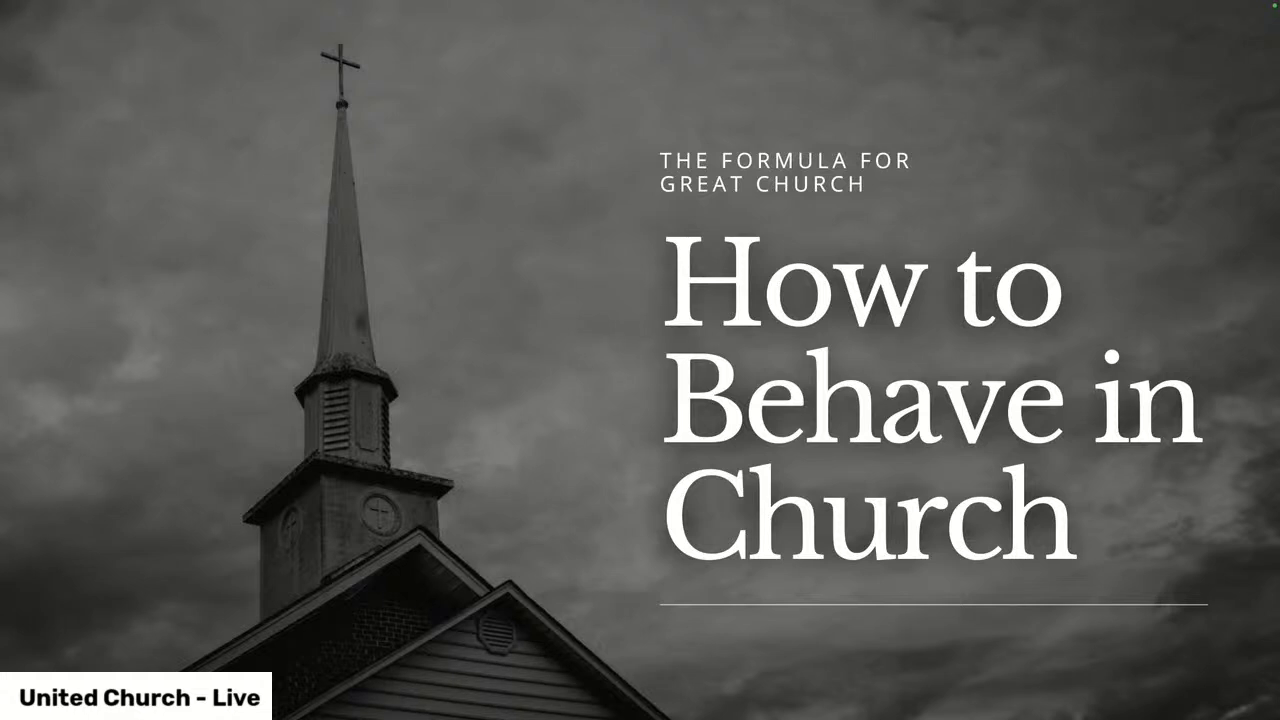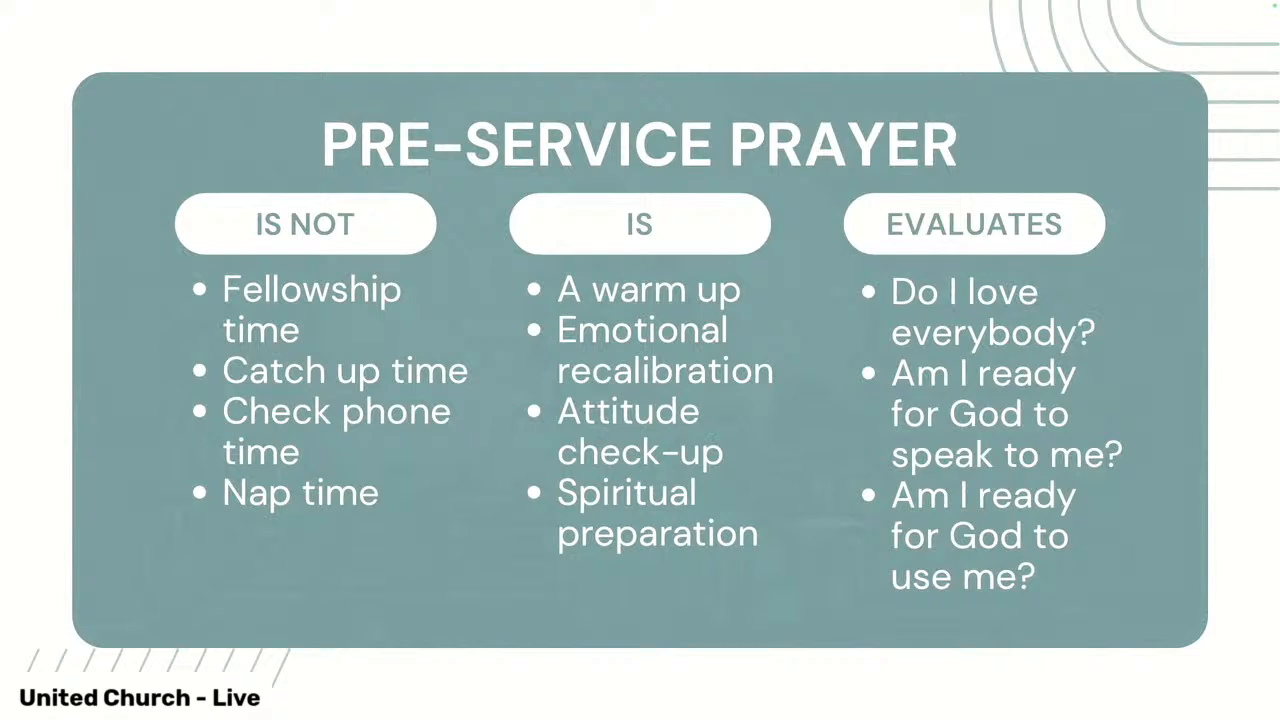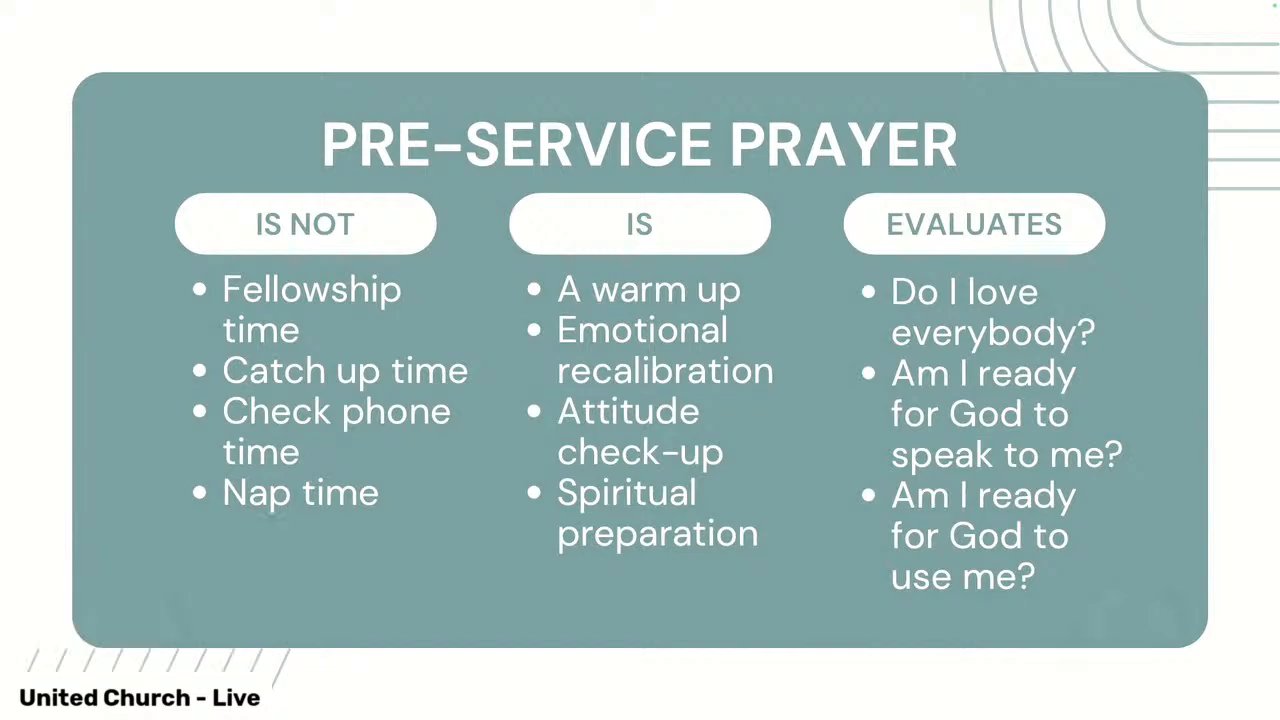How to Behave in Church: A Comprehensive Guide Pt 2

In the second part of our series on church behavior, we delve deeper into the importance of creating a vibrant church culture. This guide will outline the essential principles and practices that foster a welcoming and spiritually enriching environment for all congregants.
Table of Contents
- Introduction to Church Behavior
- The Importance of Church Community
- Unity in Vision: Why It Matters
- Doctrines vs. Formulas
- The Greatest Commandment
- Creating an Atmosphere of Worship
- Understanding Church Culture
- Going to Church: A Personal Journey
- The Role of Prayer in Church
- Personal Prayer: Building a Strong Foundation
- The Importance of Public Prayer
- Corporate Prayer: Strength in Numbers
- The Necessity of Pre-Service Prayer
- Attitude Check: Preparing for Worship
- Fasting: A Spiritual Discipline
- Conclusion: Building a Vibrant Church Atmosphere
- FAQs about Church Behavior
Introduction to Church Behavior
Understanding how to behave in church is essential for fostering a positive atmosphere. Church is a place of worship, community, and spiritual growth. Knowing the expected behaviors helps everyone feel welcomed and valued.
Key Principles of Church Behavior
There are several principles that guide appropriate behavior in church:
- Respect for others and their beliefs
- Active participation in worship and community activities
- Open-mindedness towards diverse perspectives
The Importance of Church Community
A strong church community provides support and encouragement. It creates a sense of belonging, allowing individuals to connect with others on their spiritual journey.
Benefits of a Church Community
Being part of a church community has many advantages:
- Shared experiences and mutual support
- Opportunities for service and outreach
- Growth in faith through collective worship

Unity in Vision: Why It Matters
Unity in vision is crucial for any church community. When members share a common purpose, they can work together effectively and harmoniously.
Impact of a Unified Vision
A unified vision helps prevent division, which can hinder growth and spiritual development. Here are key reasons why unity in vision matters:
- Promotes collaboration among church members.
- Fosters a sense of belonging and commitment.
- Encourages collective efforts towards shared goals.
Doctrines vs. Formulas
Understanding the difference between doctrines and formulas is essential for spiritual growth. Doctrines are unchanging truths, while formulas can evolve.
Defining Doctrines
Doctrines are foundational beliefs established by scripture. They provide a stable framework for faith:
- Doctrines are eternal and cannot be altered.
- They guide moral and ethical decisions.
Understanding Formulas
Formulas, on the other hand, are methods that can change over time. They adapt to new circumstances while still aligning with core doctrines. For example:
- Formulas for worship may evolve, but the essence remains the same.
- They allow for growth and adaptation in practice.
The Greatest Commandment
At the heart of our faith lies the greatest commandment: to love God and love others. This principle guides our actions and interactions within the church community.
Understanding the Commandment
Jesus emphasized love as the foundation of our relationship with God and each other. By prioritizing love, we create a nurturing environment.
- Love God with all your heart, soul, and mind.
- Love your neighbor as yourself.
Creating an Atmosphere of Worship
Worship is not just a routine; it’s an experience that should engage our hearts and minds. To foster a true atmosphere of worship, we must be intentional in our approach.
Elements of a Worshipful Environment
Creating this atmosphere involves several key components:
- Encouraging participation from everyone.
- Being open to new expressions of worship.
- Removing distractions to focus on God.
Shaking Up the Routine
To avoid monotony, we should periodically change our worship practices. This helps prevent complacency and keeps our faith vibrant.
Understanding Church Culture
Church culture is unique and impactful. It shapes how we experience worship and community, much like the atmosphere in a library or a cemetery.
The Atmosphere of Church
In a church, we aim to create an environment of life and respect. This is different from libraries or cemeteries, where silence and solemnity reign. Here, the focus is on spiritual growth and joy.
Key Elements of Church Culture
- A welcoming attitude towards newcomers
- Encouragement of participation in worship
- Openness to different expressions of faith
Going to Church: A Personal Journey
Going to church is more than a routine; it's a personal journey filled with anticipation and joy. Each visit can deepen our connection with God and our community.
Anticipating Church Days
Many people express excitement when church days arrive. This feeling reflects a desire for fellowship and spiritual renewal.
Making Church a Habit
Regular attendance helps to cultivate a sense of belonging. It also strengthens our faith and encourages personal growth.
The Role of Prayer in Church
Prayer is a vital part of church life. It creates a connection between the congregation and God, fostering a sense of unity and purpose.
Types of Prayer in Church
There are several forms of prayer practiced in churches that enhance the worship experience:
- Public Prayer: Often led by a pastor or leader, these prayers invite the congregation to join in collective worship.
- Corporate Prayer: This type of prayer involves the entire church community, focusing on common goals and needs.
- Personal Prayer: Encouraging individual connection with God, allowing for personal reflection and supplication.
Creating an Atmosphere of Prayer
For prayer to be effective, the church must cultivate an environment that encourages it. This includes:
- Regular prayer meetings to build community and strengthen faith.
- Encouragement of spontaneous prayer during services, allowing the Holy Spirit to guide the moment.
- Teaching on the importance and power of prayer in personal and communal settings.
Personal Prayer: Building a Strong Foundation
Personal prayer is crucial for spiritual growth. It lays the groundwork for a deeper relationship with God.
The Importance of Personal Prayer
Engaging in personal prayer allows individuals to:
- Express their thoughts and feelings directly to God.
- Seek guidance and clarity in their lives.
- Develop a habit of turning to God in all circumstances.
Developing a Personal Prayer Life
To strengthen personal prayer practices, consider the following steps:
- Set Aside Time: Dedicate specific times each day for prayer to create consistency.
- Create a Comfortable Space: Find a quiet place where you can focus and connect with God without distractions.
- Use Prayer Guides: Utilize books, scripture, or apps that can help structure your prayer time.
Benefits of Personal Prayer
The impact of personal prayer extends beyond the individual:
- It enhances emotional and spiritual well-being.
- It promotes resilience during challenging times.
- It fosters a sense of peace and clarity in daily life.
The Importance of Public Prayer
Public prayer plays a crucial role in the church community. It not only brings individuals together but also strengthens their collective faith and commitment.
Building Community Through Prayer
When we engage in public prayer, we invite God's presence into our gatherings. This shared experience fosters unity, allowing congregants to feel connected with one another and with God.
- Public prayer serves as an invitation for the Holy Spirit to move among us.
- It encourages individuals to express their faith openly.
- Praying together helps build trust and camaraderie within the church community.
Encouraging Spiritual Growth
Public prayer also promotes spiritual growth among church members. It creates opportunities for learning and deepening one's faith.
- Praying in public settings helps individuals become more comfortable with their faith.
- It reinforces the importance of prayer as a communal practice.
- Public prayer can inspire others to engage in personal prayer more regularly.
Corporate Prayer: Strength in Numbers
Corporate prayer is a powerful expression of faith that involves praying together as a church body. This practice magnifies the impact of individual prayers and fosters a spirit of unity.
The Power of Collective Prayer
When the church prays together, it creates a powerful atmosphere for God's work to manifest. Here’s why corporate prayer is significant:
- It amplifies the voices of the congregation, creating a stronger plea to God.
- Collective prayer encourages accountability among members.
- It allows individuals to experience the strength and support of their community.
Creating Intentional Prayer Opportunities
To maximize the benefits of corporate prayer, churches should create intentional opportunities for congregational prayer.
- Organize pre-service prayer sessions to prepare hearts for worship.
- Establish regular corporate prayer meetings to address specific needs.
- Encourage participation in prayer walks or community prayer events.
The Necessity of Pre-Service Prayer
Pre-service prayer is crucial for setting the tone of worship. It is not a time for casual conversation but a moment to prepare our hearts and minds for God's presence.
Creating a Focused Atmosphere
During pre-service prayer, we shift our focus from daily distractions to spiritual readiness. This time allows us to:
- Seek God's guidance for the service.
- Invite the Holy Spirit to move among us.
- Prepare our hearts for worship and connection.

Warm-Up for Worship
Just as athletes warm up before a game, pre-service prayer acts as our spiritual preparation. It helps us to:
- Emotionally recalibrate after the week.
- Check our attitudes and intentions.
- Become sensitive to the needs of others.
Attitude Check: Preparing for Worship
Pre-service prayer serves as an attitude check, allowing us to reflect on our readiness to worship. It’s a time to clear our minds and hearts of any negativity.
Evaluating Our Hearts
As we enter this sacred time, we should ask ourselves important questions:
- Am I ready to connect with God?
- Do I hold any grudges or negative feelings?
- How can I support others in their worship experience?
Engaging in Collective Worship
When we come together for pre-service prayer, we create a powerful collective atmosphere. This shared experience enhances our worship, making it more impactful:
- We can worship freely without distractions.
- Our collective faith strengthens the community.
- We become vessels for God's spirit to flow through.

Fasting: A Spiritual Discipline
Fasting is a spiritual practice that can greatly enhance our church experience. It involves setting aside physical needs to focus on spiritual growth and connection with God.
The Purpose of Fasting
Fasting serves multiple purposes within the church community:
- Personal Growth: It allows individuals to deny their flesh and cultivate a deeper reliance on God.
- Corporate Unity: When practiced collectively, fasting can create a powerful atmosphere of prayer and worship.
- Spiritual Breakthrough: It prepares hearts for receiving God's presence and guidance during services.
Implementing Fasting in Your Life
To incorporate fasting into your routine, consider the following steps:
- Choose a Day: Set aside a specific day each week for fasting.
- Plan Your Fast: Decide whether to fast a meal or an entire day.
- Pray During Your Fast: Use this time to deepen your prayer life and seek God's direction.
Conclusion: Building a Vibrant Church Atmosphere
Creating a vibrant church atmosphere is essential for spiritual growth and community. It requires intentional effort from every member to foster an environment where God can move freely.
Key Elements of a Vibrant Atmosphere
To build this atmosphere, focus on the following elements:
- Prayer: Regular prayer, both personal and corporate, lays the foundation for spiritual synergy.
- Thankfulness: Approach church with a heart full of gratitude to invite God's presence.
- Unity: Encourage collaboration and support among members to strengthen community bonds.
Inviting God's Presence
Ultimately, a vibrant church atmosphere invites God's presence. By practicing prayer, fasting, and thanksgiving, we create a space where individuals can encounter God and experience transformation.
FAQs about Church Behavior
Understanding common questions about church behavior can help congregants navigate their experiences more effectively. Here are some frequently asked questions and their answers.
What should I wear to church?
Dress appropriately for worship. While many churches have varying levels of formality, it's generally best to wear respectful and modest clothing. If unsure, consider reaching out to the church for guidance.
Can I bring my children to church?
Yes, children are welcome in church! Many congregations offer programs specifically for kids. Parents should ensure their children understand the importance of being respectful during services.
Is it okay to use my phone in church?
Using phones during service is usually discouraged. It's best to silence your device to minimize distractions. If you need to take a call or text, please step outside.
What if I have questions during the service?
If you have questions, consider writing them down and discussing them after the service. Many churches also have opportunities for Q&A sessions or small groups.
How can I get involved in church activities?
Getting involved is encouraged! Start by attending church events, speaking with leaders, or joining a small group. This is a great way to meet others and grow in your faith.
What should I do if I feel uncomfortable in church?
If you feel uncomfortable, it's important to address those feelings. Consider speaking with a trusted member or leader for support. Remember, everyone is there to worship and support one another.
